Sep 14, 2016 Politics
Phil Goff at the mayoral candidates debate in St Heliers Bay, with Mark Thomas just behind him.
Phil Goff enjoys big-name recognition in his campaign to become mayor, and his centrist message — fiscal rigour while embracing the newly adopted plans for compact growth — seems to be finding favour with voters. But is he just Len Brown #2? And what about Vic Crone? Why isn’t she doing better?
On a recent sunlit winter Saturday in Howick, members of the Residents and Ratepayers Association gathered in the Fencible Lounge to hear Auckland mayoral candidates make their pitches. The woman chairing the meeting, association head Gayleen Mackereth, felt comfortable enough with the largely elderly and overwhelmingly white crowd to complain about all the Chinese builders in Flat Bush and Dannemora. She wondered aloud, who would hold them to account if they did shoddy work and left the country?
None of the candidates rose to the bait: they were happy to talk about building standards but they were not going to talk about race. Mackereth’s colleague, the designated timekeeper, tried to blunt the impact of her musings by saying he’d heard stories of the same problem with Irish builders.
We’re not good at talking about race. The problem of Chinese immigrants. The problem of Pakeha not wanting to evolve their view of what’s “normal”. The problem of poor brown kids. The problem of rich white kids.
Auckland has record immigration and we don’t really know what it’s doing to jobs, business growth, property values, pay rates, housing availability, heritage values, school rolls, you name it. But most of us reckon we have a pretty good idea, one way or another.
Auckland also has a growing disconnect between the achievements of “elite” schools and the struggles of those in the lowest deciles. We don’t know how to talk about that either.
The issue of race and the often-related issue of entitlement simmer away in this election campaign. There’s no Winston Peters, no one to publicly address them from the platform in public meetings, but they’re always there.
They were the subtext of a question on a cold Monday night at a meeting in St Heliers, when someone asked why the council put so much money into non-core “events”.
Most candidates responded by fretting about the money being spent by the council’s events and economic development agency, ATEED. Only Phil Goff, the long-time Labour MP who is standing as an independent, defended the events programme. He said the likes of “the Chinese Lantern Festival, Diwali, Pasifika and the Anniversary Day Regatta” all added immeasurably to the quality of the city.
Race was there when centre-right candidate Mark Thomas, at the same meeting, complained about the cost of the new Wero Whitewater Park in Manukau. He added that he and his family had helped clean up a stream near the meeting venue, and wondered why that activity didn’t get more funding instead.
Environmentalism gets an easy pass in the eastern suburbs. Facilities for South Auckland not so much, even when they have obvious recreational, educational and life-skills benefits.
The candidates have a busy schedule of these meet-the-people debates and most of them are organised by residents’ associations and business groups. The audience is almost always white and elderly. Even at a Dominion Rd Business Association lunch — a catchment you might think was thrivingly multicultural — most attendees were Pakeha.
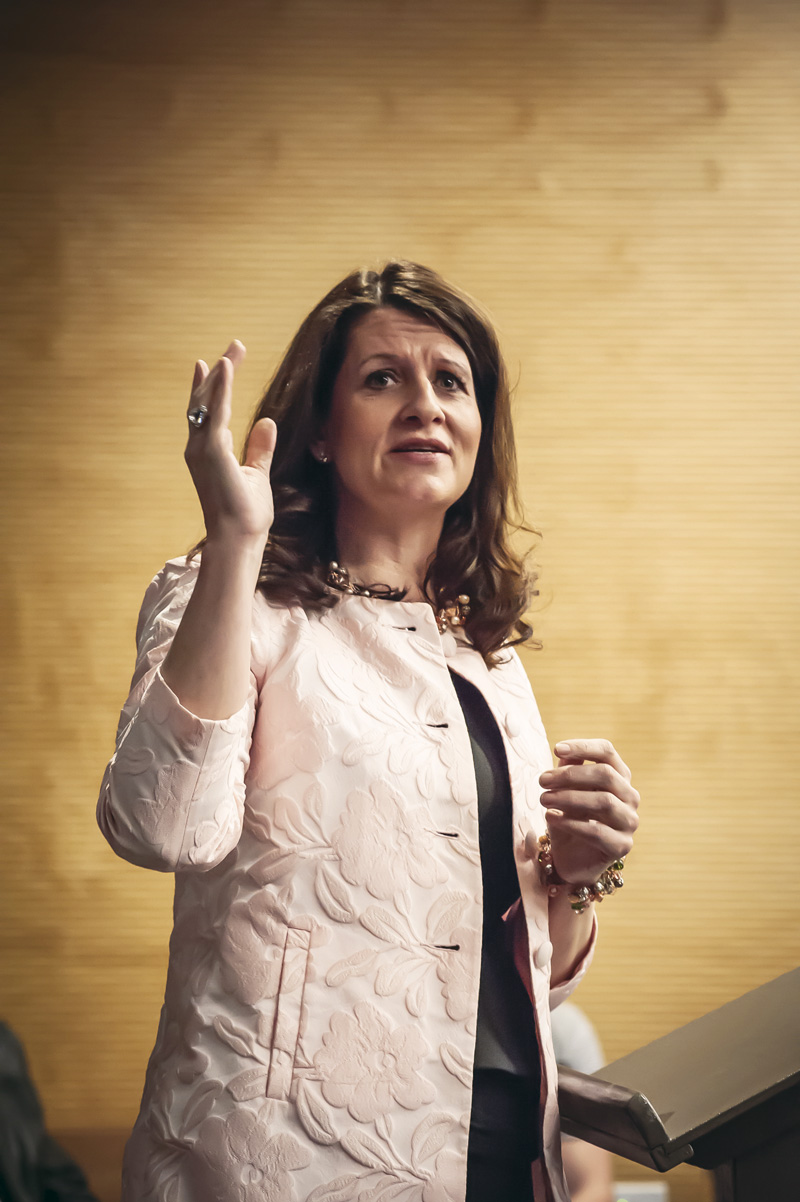 Vic Crone.
Vic Crone.
You get a very skewed idea of the citizenry from these meetings, although not necessarily of the voters. While only 35 per cent of Aucklanders voted in the 2013 council elections, 89 per cent of the 70+ age group did so.
It’s race rather than age that sits behind John Palino’s grand plan. He’s the independent right-wing candidate who stood last time, then got embroiled in mayor Len Brown’s sex scandal, then disappeared and has now come back for another go. God loves a trier, or so he clearly thinks.
The polls don’t, though. Indications so far are that Goff, Brown’s heir apparent, will be untroubled by Palino or indeed any of the other candidates in this election. Even Victoria Crone, the designated National Party proxy, surprisingly cannot get cut-through with her next-generation businesswoman profile.
Palino has a big idea: he wants to build a complete new satellite city somewhere near Auckland’s southern boundary. Immigrants will live there, and not only that, they will also build it and pay for it. No commuting up the motorway: everyone who lives in Palinoville will also work there. It will be so big and so self-contained, it will have its own university.
He doesn’t say it, but the message is pretty clear: Auckland would be better off if new Chinese immigrants were gathered up and quarantined somewhere in the Bombay Hills. He isn’t alone in thinking this, but it doesn’t seem to be helping him with the votes. What exactly was his role in that absurd sexual affair? Whatever. He got 109,000 votes last time but he’s looking at a tiny fraction of that now. Cameron Slater is still his biggest supporter, ranting away on his Whale Oil blog, but that just makes it worse, really.
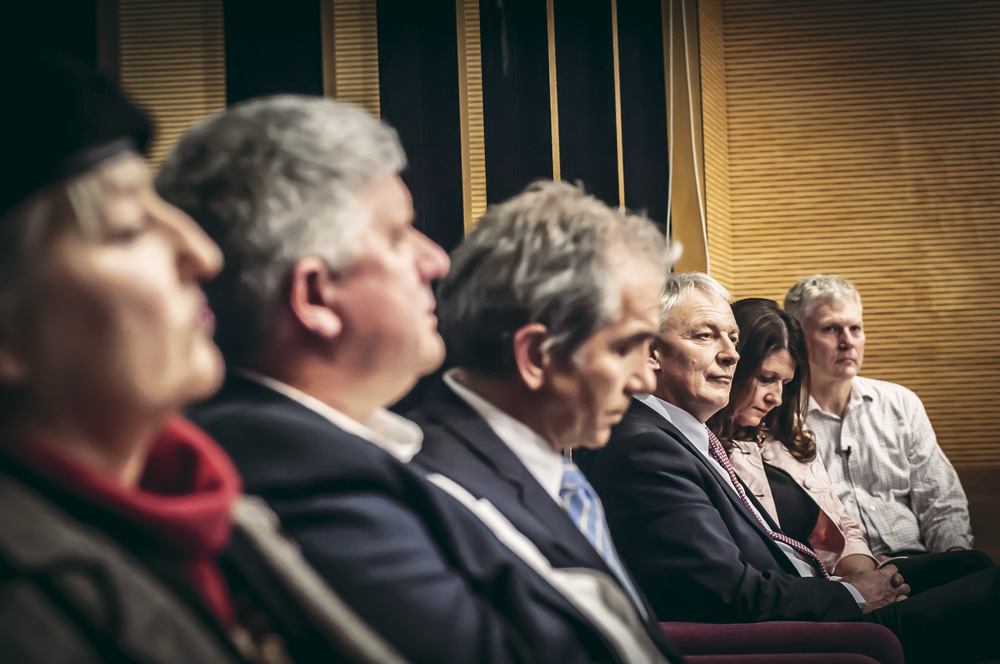 Mayoral candidates at the St Heliers debate — from left, Penny Bright, David Hay, John Palino, Goff and Crone — with meeting chair Don Stock.
Mayoral candidates at the St Heliers debate — from left, Penny Bright, David Hay, John Palino, Goff and Crone — with meeting chair Don Stock.
Auckland has a crisis. Actually, it has several crises. The litany is well known: housing, transport, health and education issues in the poorer communities, the struggles of an economy trying to reinvent its priorities and profit options in a digital age, all the pressures that come with having a third of the country’s population and facing more than half its entire growth. Forty thousand more people a year. Eight hundred more cars every week.
Laid over all of that is another stark and extremely uncomfortable fact: we, the citizens of Auckland, think the council is fucked.
Laid over all of that is another stark and extremely uncomfortable fact: we, the citizens of Auckland, think the council is fucked. We might love the waterfront, the redeveloped beaches, the revitalisation of urban spaces, the improvements to public transport and all the other riches that flow from our proud, inspired efforts to reinvent ourselves as a modern city, but we don’t thank the council for any of it.
In a Citizen Insights Monitor survey released by Auckland Council in June, just 15 per cent of us said we were satisfied with the council’s performance. Only 17 per cent of us said we trust it. This is disgraceful. Councils elsewhere commonly enjoy more than 50 per cent support; in a 2015 survey in Brisbane, satisfaction with the delivery of services was at 70 per cent.
These results should have led to a major reckoning inside the council, with public acknowledgment they were getting things badly wrong and a publicly announced commitment to fix the problem. Incredibly, there’s been no sign of that at all.
So what’s a new mayor going to do about it? This is top of the list. Not because it’s more important than housing or transport, but because a council that does not enjoy public support is a council that cannot enable the city to develop or to address the other issues properly.
A council without public support also risks seeing its councillors voted out of office and its plans undone. Or just not voted for at all. The low turnout last time was one of the worst in the country. This time, it could be even lower.
All the mayoral candidates agree the culture of the council is a major problem, and all say they are determined to address it. But what exactly is the problem, and how will they address it? It’s hard to get an answer.
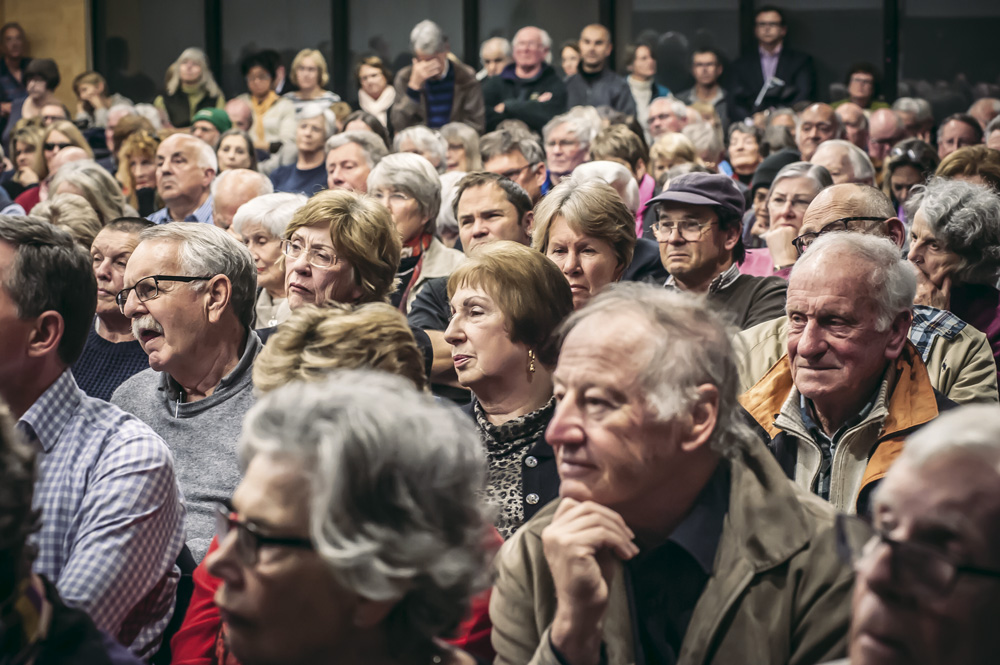
I asked Vic Crone, over coffee one morning in the corner of a downtown restaurant. She’s the independent centre-right candidate who has the tacit support of the National Party, and the first thing she said was, “There’s a stigma. Local bodies are not seen as a worthwhile career option.”
Is that really why people don’t trust the council? Then she talked about the “structural shift”, by which she meant the creation of the supercity in 2010, that “most people have not woken up about”. Then she added that the council was not delivering in “so many ways”. I asked her to elaborate.
“Well, it’s congestion. It’s the buses not turning up on time. The trains. You know, they sometimes don’t run the trains but they don’t tell people in advance, so people are stuck at night-time in parts of Auckland with no transport. It’s rubbish, particular in Rodney, in terms of changing the rubbish setup, going to a more expensive setup. It’s actually everything.”
She talked about “momentum”, about what happens when the mood turns. I thought she’d just demonstrated it rather well: little problems become big ones, solvable issues become part of a pattern that looks like a crisis, really big and complex problems like “congestion” provide easy criticism.
And you can make generalised complaints. Crone is right that public transport is not as reliable as it should be. It’s a real problem. But she’s not right that services are arbitrarily cancelled without the public being told, as anyone who uses trains or buses and has seen the electronic displays (or has signed up for text updates) would know.
Later in the interview, she came back to the issue of communication. “Why don’t they let each community know how changes will affect them?”
Aren’t they doing that? Community meetings, newsletters with the rates bill, you can sign up for emails… “Yes, but they need to use modern digital tools.
Facebook. Community hall meetings are not the way.”
She would stop community meetings?
“No, I’m not saying that. But they should be making virtual-reality videos to show what each community will look like.”
She would spend more money on communications?
“No. Better communications, not more money.”
Aren’t virtual-reality videos expensive?
“No.”
Really?
“No, they’re not.”
Over lunch in a cafe in Howick, I asked Phil Goff the same question about changing the culture of the council. He said every meeting he goes to, people tell him a story of their frustration.
He had an example concerning the local Rotary club, which wanted to put out signs to promote their Bookarama fundraising event. Auckland Transport (AT), owned by the council, said no. Rotary pleaded. AT said okay, but it will cost you $170. Rotary said okay. AT said, that’s $170 per sign. They had about 50 signs.
Goff will require the council CEO to get consultants’ advice on culture change, and implement it. Crone says no consultants.
I asked him what he would do about that kind of mentality, and he said he had been talking to former Air New Zealand bosses Rob Fyfe and Norm Thompson about how they turned the airline into a high-performing, customer-focused company. “They told me they got rid of a layer of clay,” said Goff.
Goff will require the council CEO to get consultants’ advice on culture change, and implement it.
Crone says no consultants. She backs herself to know what to do: been there, done that already, she says.
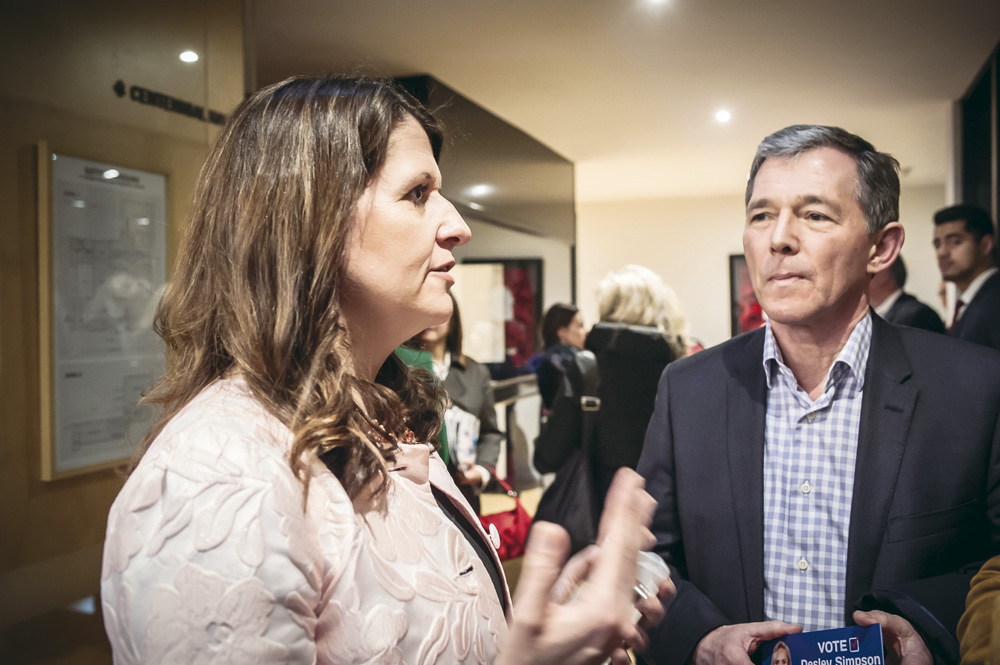 Crone with National Party president Peter Goodfellow.
Crone with National Party president Peter Goodfellow.
There are several reasons for the lack of public confidence in the council. The first is embodied in that Rotary Bookarama example: too often, council officers are obstructionist rather than enabling.
It’s not just community groups that suffer, either. Restaurateurs and other business owners all over town have stories of how hard council officers make it to do business. Goff says the officers are risk-averse. “You don’t get sacked for saying no.”
There’s good reason for their caution: council officers are supposed to prevent leaky buildings and contaminated water supplies, and they don’t get any thanks when they fail. But it doesn’t follow they have to be looking for excuses to say no. The attitude should be: we’re here to help you get it right, not, we’re here to trip you up.
Crone is undoubtedly right that the council has left many people behind. Not so much because of its structure, but because of its plans. It has a 30-year vision for the city that assumes big changes in demographics, technology and lifestyles. That’s always going to be a hard sell to people who perceive those changes as threats to what they already have.
Len Brown’s ability to sell that vision has not been helped by the endless snarky references to “Len’s trainset”. Still, he sold it well enough to the government: getting them to do a 180 and support the City Rail Link is an outstanding — and unexpected — achievement of his mayoralty.
Another reason for the lack of confidence in the council? Failure to deliver. As Crone knows, there’s a special kind of frustration experienced by anyone who waits for a bus that doesn’t come when it should, or discovers AT has not told them about a problem with the money on their Hop card. And those customers all reserve a special place in hell for the council officers who didn’t care enough to get it right.
Another reason? National Party president Peter Goodfellow had a one-word answer when I asked him why he thought Aucklanders are unimpressed by their council: “Rates.”
The Auckland Council has put all ratepayers through a balancing exercise over the past six years, as it amalgamated the rates regimes of the eight legacy councils that used to exist. Some ratepayers — especially, as it happens, in the eastern suburbs — have had hefty rates increases to bring them proportionally into line with everyone else.
You could say that’s unfair, or you could say they weren’t paying enough before.
Crone blasts the current council for raising rates 50 per cent in the past six years. She also argues that debt is unacceptably high and council spending is growing too fast.
But rates rose fast because previous councils neglected to fund infrastructure. The citywide alignment is now achieved and the period of hefty adjustments is over. The council’s new annual budget allows for a 2.4 per cent average rates increase. Debt levels are within acceptable limits, according to the guidelines set down by the Auditor-General. And the council’s growth has been commensurate with the growth of the city’s population.
Still, all the candidates pledge themselves to fiscal rigour. The council’s integrated IT system is costing $1.2 billion, which Crone claims is far too much. Goff says procurement systems are geared to risk-aversion, not cost efficiency. Crone ramped that up in Howick, dramatically telling the meeting that “every aspect of buying and selling costs 30-40 times too much”. Confidence that money is being spent well is low.
Crone has signed the Auckland Future pledge to keep the rates increase at 2 per cent; Goff says 2.5 per cent. The difference is not significant.
Auckland Future makes a big thing of this pledge. It’s still the only policy on its website, as if the only reason its candidates would run for office is to control costs. That’s hard to fathom.
There’s one more really obvious reason Aucklanders don’t think much of the council. It’s Len Brown’s sex scandal. Not the fact of his having had an affair, but the lack of judgment he showed in taking the stupid risks he did, the ridiculously awful details we all learned about and can’t unlearn, and his political myopia in not recognising how damaged he was by the loss of public respect.
His refusal to do the decent thing and resign compounded that lack of respect. And as it became clear he could not front the council’s bold plans for growing the city, those plans themselves started to drift. His deputy, Penny Hulse, soldiered on, but the mayor needed to be demonstrably in charge, as he was in his first term. And he has not been.
The lack of respect is still as strong as ever. When Brown spoke at the public event to welcome home the All Blacks after the Rugby World Cup victory late last year, he was booed. When he gets up to speak at black-tie events, guests keep up a muttered commentary of tawdry jokes. The public doesn’t respect the council because it doesn’t respect the mayor. And that is going to take some fixing.
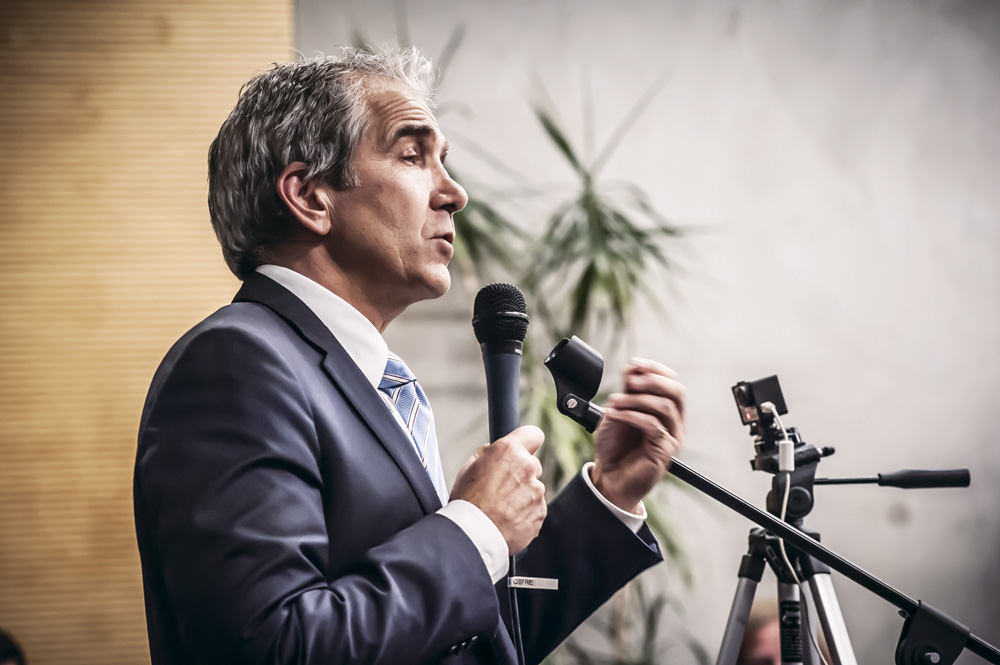
Is John Palino the mini-Trump?
Like Donald Trump, John Palino assumes his audiences don’t know a lot. He tells them he will reduce rates by 10 per cent without significantly affecting services. He’s got a simple solution to complex problems and his core message is that he will preserve all the things they believe are now under threat. He’s a populist.
But Palino isn’t Trump. He doesn’t suggest the election will be rigged or make veiled threats to the safety of his opponents. He doesn’t swing wildly from one outburst to the next and he’s not a bully. John Palino presents as a genuinely nice guy: quiet, affable, deeply concerned.
The populism is different, too. Trump’s core appeal is to white, working-class men who’ve watched the world leave them behind and don’t want to try to catch up. In Auckland, the people who feel the council has dispossessed them most are white, yes, but they’re also relatively wealthy and very definitely have not been left behind. They object to the way their rates bills have risen; they do not want to share their leafy suburbs with any more people than live in them now.
Palino is chasing the votes, not of the dispossessed, but of people who’ve got more than everybody else and don’t want to give any of it up.
And there’s one more difference: Palino began this campaign calling the Unitary Plan a con job that had to be stopped. He still says it’s not a good plan, but he also says it’s a done deal and they have to move on. Trump would never let a little thing like reality get in the way like that.
So. A quagmire of unspoken resentments, financial confusion, missed opportunities and disappointing mediocrity. And here’s Vic Crone, declaring herself a new kind of candidate, who wants to take charge.
She’s a woman, at 43 a generation younger than Goff, who’s 63. She’s the business candidate, a council outsider, and because her business experience is in IT (at Xero, Chorus and Telecom), she’s future-focused.
Yet she is not doing well. Just 15.5 per cent support in the Spinoff poll published in late August, against Goff’s 60.3 per cent. Why so poor?
The council is a quagmire of unspoken resentments, financial confusion, missed opportunities and disappointing mediocrity.
Her centre-right constituency is comfortable voting for women but it’s not a special thing . Same for her age. Her campaign team has had walkouts. On RNZ’s Morning Report last month, the Prime Minister, despite his early enthusiasm for her candidacy, declined to endorse her.
Crone is not always well tuned to the issues. On another chilly night, this time in the Baptist hall in Milford, she was asked if she would ensure the next harbour crossing was dedicated to rail to the Shore. She said no, rail might be included at some stage but the focus for the next harbour crossing would be roads.
She misread the meeting badly: rail to the Shore is a clarion cry uniting left and right north of the bridge. It’s also a clarion cry for everyone claiming to be future-focused. Everyone except her.
As for the perennial appeal of a business candidate, Crone’s record is not blemish-free. She joined Xero in a high-profile appointment, but less than two years later surprised its CEO, Rod Drury, by leaving to run for office. At around the same time, she got herself elected to the board of Contact Energy, making a commitment to shareholders to remain on the board that she cannot possibly keep if she wins the election.
There are also the things she says. She does corporate speak: “What does the brand personality of Auckland look like on the world stage?”
In the early days, she kept promoting driverless buses, which made her sound a bit wacky. She doesn’t do that now, but she does like to talk about street signs. “We’re making everything look the same: street signs, the buses, the way they redo the streets. We’re going to go broke doing that.”
Broke? It doesn’t sound like a business leader who’s good at strategic thinking and dealing with big issues. Strangely, although she likes to talk about the future, she doesn’t believe she should have a big idea. “I don’t think people are ready for it.”
Why does she think things aren’t working out better for her? “You know,” she told me, “I actually wonder whether Auckland isn’t frustrated enough yet.”
On the campaign trail, she says it’s going well. “I meet people all the time who say they weren’t going to vote, but now they’ve heard me speak, they will.”
She said, “The question is, ‘How do we face the future?’ We’re not doing that.”
But isn’t that what the Unitary Plan is: a future-focused plan that anticipates big changes and sets up the rules for dealing with them?
“Yes, it does. And that’s good. But look, it’s true we need to be world class, and that has three parts. We need to be a smart city. We need to be inclusive, of people in all parts of the city, and different ages and ethnicities.”
Mark that: she’s not beating the immigration drum.
“And we need to be competitive. I am the only one saying Auckland should be a digital city.”
But isn’t the council saying that? And the government? Being digitally smart, inclusive and competitive: isn’t that what everybody says?
“The council is spending $1 billion on IT, and it’s the biggest waste I’ve ever seen. People laugh. Broadband is great but where is the connected Wi-Fi? Why don’t we have smart traffic lights, digital monitoring of water quality? There should be a sensor on the pipes in this restaurant, so the council will know what’s being tipped down them, and they can work with anyone who’s doing it wrong.”
Why is the council’s own digital development so important? “The council should model behaviour. It should be 10 per cent ahead of the rest.”
Crone says she would establish an independent budget office that will analyse the mayor’s budget proposals and report directly to the governing body of the council. While Goff talks about calling in consultants, this is one area where she would effectively do the same.
She also tells public meetings she is the only candidate with direct experience running billion-dollar budgets. It’s simply not true about Goff, who has been minister of housing, education, foreign affairs, trade, defence and, for heaven’s sake, associate minister of finance.
It’s also misleading in relation to her own record.
You were New Zealand managing director at Xero?
“Managing director, CEO. Titles change.”
Hasn’t Rod Drury has always been CEO?
“I was in charge of New Zealand and new markets. That’s 180 countries.”
But you didn’t run a billion-dollar budget for Xero?
“No, my budget there was $70-80 million. I did everything except product development and customer service.”
Before that she was at Chorus and Telecom.
“At Chorus I was the marketing and sales manager. At Telecom I was the general manager of retail sales. They were billion-dollar budgets.”
To her credit, Vic Crone is not John Palino. She’s not telling people the Unitary Plan is ridiculous or that she’ll lower their rates. She’s not, as noted, blaming migrants for anything. Her problem is, if she’s not the candidate of the angry right and she’s not the candidate with the political experience to sort this council out, what is she? The leader for the future who doesn’t believe in big ideas? How does that work?
When she left, the restaurant owner asked me who she was.
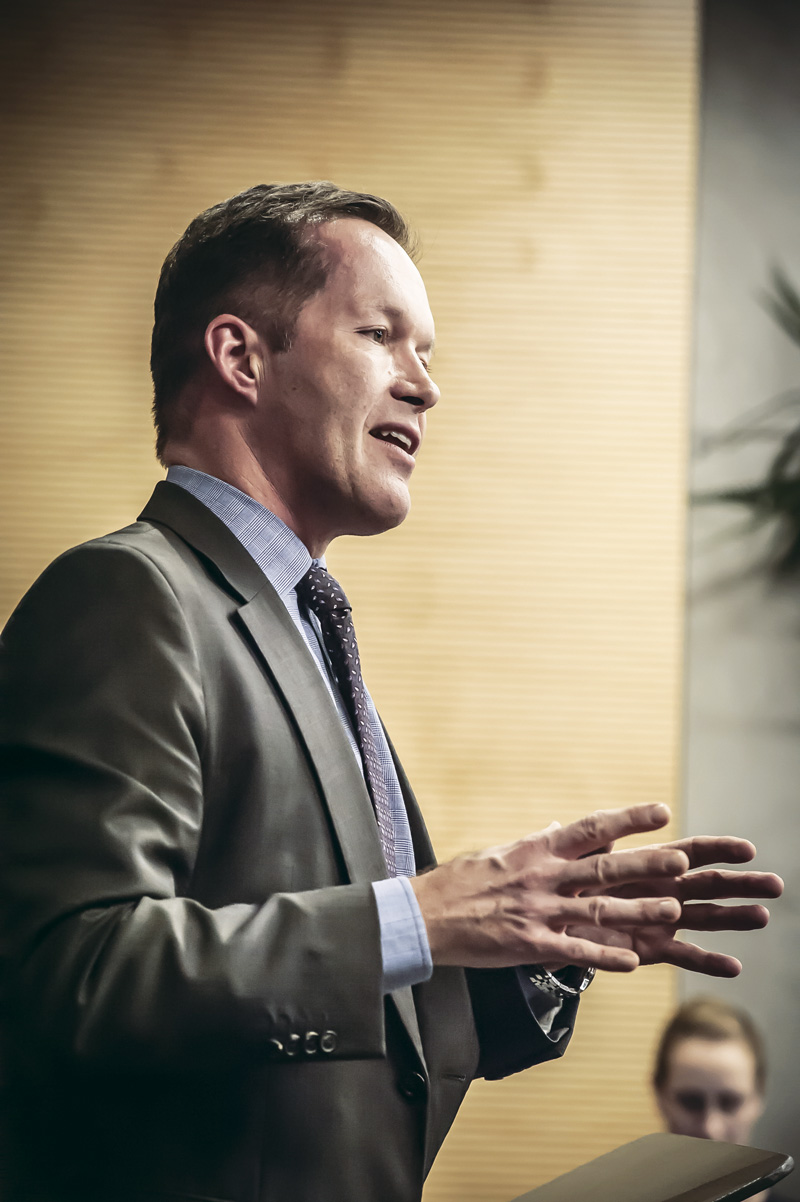
Why isn’t everyone voting for Mark Thomas?
Mark Thomas has political experience, as a two-term member of the Orakei Local Board and a member of the government’s Rules Reductions Taskforce (set up to reduce red tape in council operations). He has business experience, running his own companies, and also in corporate management roles (he has been ANZ’s head of group marketing and was in charge of its Restoring Customer Faith project — which sounds like just the sort of thing Auckland Council needs).
His pitch is strong on fiscal responsibility (spend on priorities and “cut out the externals”) and on listening to the community. Alone among the mayoral candidates, he promises to let local boards set local priorities and to fund them accordingly.
He’s the only candidate with any direct experience of Auckland Council, and he uses it well. He knows more than all the others about how things work and he’s good at explaining it. In mayoral debates he answers every question not just with facts and figures, but with an account of his personal experience dealing with the issue. It’s impressive.
On top of that, he’s a long-time member of the National Party, which you might think would mean there’s a well-oiled machine behind him raising money and getting out the vote. But there isn’t. The National Party and almost all of its fractious Auckland parts don’t want a bar of him.
Why not? The power of personality moves in mysterious ways. Thomas knows everyone in his political world and is friendly with them all, without actually having any political friends. For all his impressive command of information, he’s also inconsequential. People who turn up to mayoral debates appear to like what he tells them, but there’s little evidence they warm to him. He doesn’t have The Thing.
And because he doesn’t have the National Party behind him, a whole lot of potential voters have read the signs. Mark Thomas is not their guy.
Will he pull out? No, for the same reason he went in. He’s politically tone deaf.
And so we have Phil Goff. He’s got the political experience, but will he do anything with it? Or is he, as the wits like to say, just Len Brown with his pants on?
At that cafe in Howick, he was greeted by an Indian man about his age, clearly thrilled to meet him. The man came back minutes later, reached into his plastic bag of shopping and gave Goff a bunch of jonquils. Goff was deeply flattered. He said it was the first time a man he didn’t know had given him flowers.
The cafe was run by an Indian family and they were all excited. Came over to talk, shook his hand, plied him with extra food, got the group photo at the end.
There’s nothing forced about this. As MP for Mt Roskill Goff is hard-wired into Auckland’s ethnic communities and he knows, and greets by name, ethnic personalities wherever he goes.
He doesn’t criticise Brown directly. But it’s clear he feels the mayor — and Penny Hulse — have been too ready to accept council advice. Goff comes from a Wellington political culture where governments don’t routinely do what their officials suggest: that’s an important difference, right there.
This will come to a head over Goff’s attitude to council culture. He told a Parnell business meeting the council was a “can’t-do organisation” characterised by “duplication and waste”. He tells every meeting he attends that the city has “got to learn to do more with less”. His fiscal policy includes a 3-6 per cent “efficiency drive”. If he makes it happen, many of the officers are not going to like it.
 Goff (with heritage campaigners Sally Hughes in turtleneck sweater.)
Goff (with heritage campaigners Sally Hughes in turtleneck sweater.)
Goff’s also less needy than Brown. The mayor wants to be liked, so he says yes to everyone he talks to, but then rarely follows through. Goff resists. In Parnell, they asked the mayoral candidates to commit to a new railway station (only Mark Thomas knew it was happening anyway); in St Heliers, it was work on Tamaki Drive; in Howick, it was a wharf for ferries.
Goff said the same thing to all of them: “I’m making no promises on local projects until I see all the competing priorities. But I can say my first priority as mayor will be fiscal responsibility.”
On the bigger spending issues, he says Auckland is short of about $17-$20 billion for its long-term wish list of projects. His solution includes infrastructure bonds and, like Crone, public-private partnerships (PPPs). Unlike Crone, he also favours a regional petrol tax and/or other road-pricing options. He says big infrastructure should not be paid for by rates.
Goff’s fiscal policy includes a 3-6 per cent “efficiency drive”. If he makes it happen, many of the council officers are not going to like it.
Goff and Crone’s platforms are similar, which is one reason she doesn’t enjoy more support. But for a comparison of the political smarts surrounding the two, look no further than the billboards. Goff’s suggest experience, skill and moderation. His colour is blue, which signifies, in case you didn’t already know, that he’s happy to swallow dead rats. He’s the man in the middle, a safe pair of hands, and the government should have little trouble working with him.
Crone’s billboards suggest inexperience and couldn’t-afford-a-designer, there’s a mixed message of red and blue, and her slogan “Vote Vic” is flawed by virtue of not using her surname. Who knows how safe her hands might be.
Goff’s team is led by Labour’s long-time campaign mastermind David Lewis. Crone relies on Cabinet minister Nikki Kaye, a shifting combination of political newbies like the social networking and tech entrepreneur Lillian Grace and, in association with Auckland Future, members of the National Party old guard such as Sue Wood and Michelle Boag.
All of them will have their reputations badly tarnished by her failure to ignite the electorate. There’s a theory that National will reward Crone after this campaign by anointing her the next MP for East Coast Bays, when Murray McCully retires. But Crone has shown she’s not a natural vote-winner and it’s more likely they’ll give her a good place on the party list. For the record, she says she’s entirely focused on the mayoralty, not Parliament.
Goff and Crone are both comfortable talking about leading the city into the future. When she does it, the focus tends to be on technology: those driverless buses and the smart meters in every restaurant sinkhole. He’s more likely to talk about the Congestion Free Network, a plan for Auckland transport that focuses on rail networks, developed by the Auckland Transport Blog and Generation Zero. He doesn’t endorse it, but he is interested in it.
He knows you need political courage. He told the Milford meeting that when the Labour Cabinet, including him, decided to build the Northern Busway, it was strongly opposed on the Shore. Now it carries 40 per cent of all commuters using the harbour bridge.
His access point to the issue of cycleways is not commuting but kids: he says he was appalled to discover only 3 per cent of 13- to 17-year-olds ride a bike to school, and that’s got to change.
Goff is like Brown in obvious ways: a Labour centrist, a steady operator, a local communities guy. They can both bore the pants off you (sorry), with officialise standing in for real conversation. And it’s weird they’re the same kind of guy physically: short and relatively slight.
But Goff is a polished operator with a complex grasp of politics. If Brown was a bit out of his depth as mayor — not being able to manage his senior officers, failing to grasp the limits of acceptable behaviour — that won’t be a problem for Goff.
There’s a theory that National will reward Crone after this campaign by anointing her the next MP for East Coast Bays.
His programme is similar to Brown’s — there’ll be no attempt to overturn the Unitary Plan (Crone doesn’t want to do that either). But will he lead that programme, in the way Brown did in his first term? Aucklanders were cynical about everything before he and the supercity came along in 2010. But we lost that cynicism and we set about reinventing the city. Len Brown played a big role in that.
The job now is not simply to produce incremental improvements with greater efficiency and better relations with the government in Wellington. Auckland has fallen into crisis. Growth has far outstripped expectations. Housing policies have had a catastrophic outcome. A big vision is required, all over again, and bold execution has to follow.
Can Phil Goff do that? On the campaign trail he likes to quote the late Paul Callaghan, who said New Zealand had to become “a place where talent wants to live”. Goff says it for Auckland.
Is that who Phil Goff is? A man with a vision he borrowed from someone else? If he can rise to the challenge of leading this city out of crisis and engaging us, all over again, in making it an exciting place to live and work, it will be his greatest achievement. That’s how he needs to think of it.
This article is published in the September 2016 issue of Metro. Photos by Simon Young.





